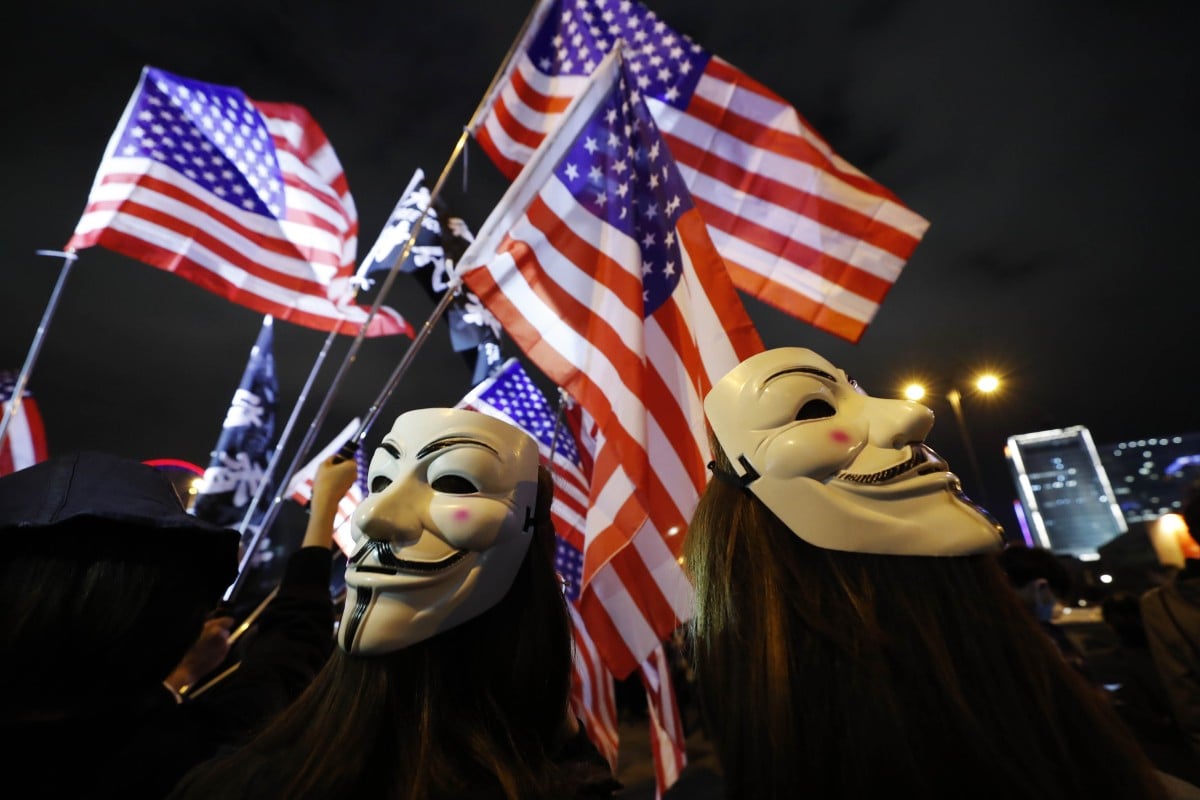Democracy Progressing in Hong Kong
"I signed these bills out of respect for President Xi, China, and the people of Hong Kong.""They are being enacted in the hope that leaders and representatives of China and Hong Kong will be able to amicably settle their differences leading to long-term peace and prosperity for all."
U.S. President Donald J. Trump
"These two bills are an obvious intervention of Hong Kong's internal affairs. They are unnecessary and without grounds."
"They will also harm the relationship and interests between Hong Kong and the United States."
The Hong Kong government of Carrie Lam, Chief Executive
 |
| Protesters wear masks and hold US flags in Hong Kong Thursday. Photo: AP |
"For starters, Hong Kong’s citizens are unhappy about squeezed living standards and high housing costs. Moreover, increasingly heavy-handed policing of the protests provoked an often-violent response, which in turn led the police to escalate their tough tactics. Pro-Beijing factions, clearly organized by local United Front communist activists, colluded with gangsters to beat up demonstrators and target the families of their suspected leaders. Suspicions grew that the Hong Kong authorities knew what was going on but had chosen to do nothing about it."
"Above all, it became increasingly apparent that China’s leaders would not allow Lam and her ineffective and often invisible government to seek any compromise with public opinion. Many demonstrators seemed to conclude that the only thing to do was to put on helmets and gas masks and brave the tear gas and water cannon. This is not to condone the violent protests, but it perhaps explains them."
Chris Patten, last Governor of Hong Kong under British Colonial Rule, 1992-97
| Anti-government protesters wearing masks depicting Simon Cheng, a former British Consulate employee, hold banners as they attend a rally outside the British Consulate General in Hong Kong on Nov. 29. (Marko Djurica/Reuters) |
Hong Kong protesters are delighted that U.S. President Donald Trump finally signed the U.S. legislation in support of the pro-democracy Hong Kong protesters. That done, they lauded Trump, and turned their eyes toward Britain whose long history with Hong Kong, endowing it with the full appreciation of democracy and parliamentary procedures to reflect the will of the people, that has given confidence to the protesters of Hong Kong that demanding their human rights and autonomous status within China are one and the same.
Now, the protesters are calling upon Britain to become involved in their campaign for greater democracy. They're dialing their past history at a time when Britain is embroiled in Brexit, in trials and tribulations with Scotland, Ireland and Wales linked to Brexit, when the Labour Party is in turmoil over accusations of anti-Semitism, when Prime Minister Boris Johnson is stick-handling another election to bring Britain to its final departure from the European Union.
But they want Britain to voice a strong pro-protest, pro-democracy statement, to go above and beyond the Foreign Office statement that "Today’s events are deeply disturbing. We are seriously concerned by the ongoing violence, and the escalation between protesters and police".
 |
| Mong Kok. Photo: Tam Ming Keung/United Social Press. |
Much less draw the British Parliament into enacting legislation similar to that of the U.S. where the Hong Kong Human Rights and Democracy Act has the U.S. State Department certifying annually Hong Kong's autonomy from mainland China to ensure that Beijing can depend on favourable trading terms and that any deviation from such expectations continuing Hong Kong's semi-autonomous status could lead to regional human rights violators facing sanctions.
A second bill was signed by President Trump that bans the sale of munitions including rubber bullets, stun guns and tear gas to police in Hong Kong. This is of course the same president who previously indicated that President Xi Jinping was a friend of his and he had no wish to counter him, yet he sympathized with the aspirations of the protesters in Hong Kong for greater democracy. But that's the thing about Donald Trump, no one can ever be certain what he will ultimately decide as his preferred course of action.
Still, Sunday's Hong Kong government was put on further notice by the people of Hong Kong when there was an extraordinary turnout at the polls and voting went in favour of the protest demands, leaving pro-democracy candidates with control of 17 out of 18 districts in local council elections. The campus of Hong Kong's Polytechnic University was swept by 400 police officers, removing objects linked to a violent standoff between police and demonstrators. With, needless to say, more to come.
 |
| Central. Photo: Benjamin Yuen/United Social Press |
Labels: Britain, Democracy, Hong Kong, Protesters, United States, Violence
0 Comments:
Post a Comment
<< Home